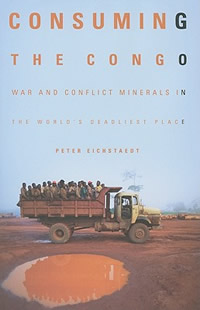Book Notes
 Peter Eichstaedt, Consuming the Congo; War and Conflict Minerals in The World's Deadliest Place (Chicago: Lawrence Hill Books, 2011), 232pp.
Peter Eichstaedt, Consuming the Congo; War and Conflict Minerals in The World's Deadliest Place (Chicago: Lawrence Hill Books, 2011), 232pp.
It takes a great leap of moral imagination to comprehend the decade of devastation in the Democratic Republic of the Congo (formerly Zaire). According to a 2008 study by the International Rescue Committee, 5.4 million "excess deaths" occurred in the Congo from 1998 to 2007, a staggering ten percent of the population and a death toll eight times greater than the Rwandan genocide. Peter Eichstaedt is not exaggerating when he calls the Congo "by far the deadliest region in the world."
Over half of those deaths occurred since the war ended in July 2003. The overwhelming majority of the victims were civilians; about half of them were children. Millions more Congolese have fled to neighboring countries as both a cause and consequence of the war. Hundreds of thousands of women have been raped. Peace accords officially ended the war, although continued hostilities and the social, economic and political consequences of the war make for a fragile peace.
How do you understand a war in a country the size of western Europe (the twelfth largest in the world), with 200 ethnic groups, and that involved nine border countries, the interventions of countries like France, Belgium, the United States, Cuba, and China, and thirty rebel militias and proxy armies composed of mercenaries from as far away as Serbia? Next to the works by Gerard Prunier, Africa's World War; Congo, The Rwandan Genocide, and the Making of a Continental Catastrophe (2009), and Jason Stearns, Dancing in the Glory of Monsters; The Collapse of the Congo and the Great War of Africa (2011), Eichstaedt focuses more narrowly on the "conflict minerals" in eastern Congo.
The Congo suffered four hundred years of political disintegration that began with the European and Arab slave trade of the sixteenth century, and was followed by the wholesale plunder of the region in the nineteenth century by Belgium's King Leopold (see King Leopold's Ghost by Adam Hochschild). When independence from Belgium came in 1960, the Congolese were hardly ready to rule their vast country. For thirty-two years president Joseph Mobutu Sese Seko, who was backed by the United States, epitomized corruption, repression, and incompetence (1965–1997). Laurent Kabila overthrew Mobutu in 1997, was himself assassinated in 2001, and was followed by his son Joseph Kabila.
The trigger for the "first" Congolese war was the 1994 Rwandan genocide, when mainly Hutu people slaughtered 800,000 Tutsis in the space of three months. A million Hutus then fled two hundred miles west into eastern Congo, set up a government in exile, and were pursued by the new Tutsi government that sought retaliation. Mobutu supported the Hutus against Rwanda's Tutsi government. About 50,000 refugees perished in the first month from starvation, cholera, thugs, and massacre by the Rwandan government. This "first" Congo war lasted until Kabila overthrew Mobutu in 1997.
Eichstaedt focuses on the "second" Congo war, which pitted Kabila's hapless and corrupt government against Uganda, Rwanda, local miners, and numerous militias in the plunder of Congo's vast natural resources of copper, cobalt, coltan, gold, and diamonds (which resources paid for the wars). He takes his readers to the sprawling refugee camp in Goma, which was built to accommodate 50,000 people but is now "home" to 600,000. We join him as he interviews UN experts, gold miners, rape victims, pastors, journalists, village chiefs, and the people up and down the supply chain of Congo's "conflict minerals."
It's a tragic irony that Congo's minerals supply only a small percentage of those that end up in our electronic gadgets like cell phones (contrary to inflated figures repeated by advocacy groups). But in a horribly impoverished country, a small percentage of a big number ads up to billions of dollars, almost none of which in the current scenario end up helping ordinary citizens and their communities. And while "name and shame" campaigns might feel good, says Eichstaedt, and the rest of the world has an obligation to do its part, only the Congolese can solve their own problems.


